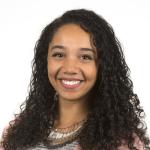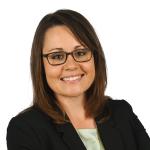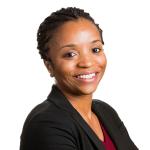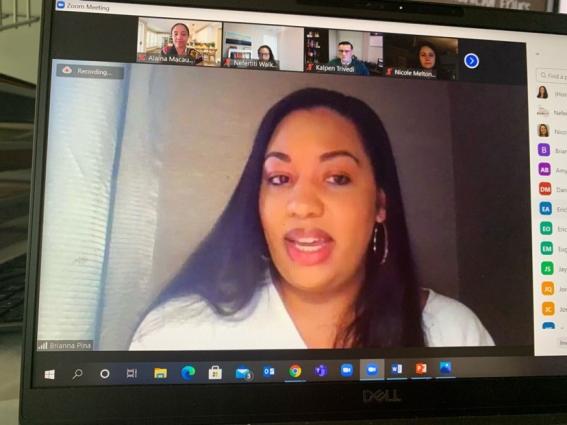Innovative Isenberg Class Focuses on D&I in Business
June 9, 2021
“More diverse teams have greater ROI. That’s what the research says,” observes junior OIM major Danielle Major. “My intro course in diversity and inclusion in business asked us to step back and determine not only who was on a team but who wasn’t.” Third-year marketing student Nicole Alvarez also valued the course: “With its tools and insights, I feel safer, more hopeful as a student going into the business world.”

Two years in the making, Introduction to Diversity and Inclusiveness in Business debuted in January. The seminar, which attracted fifty students from all seven Isenberg majors, was the brainchild and passion of three Isenberg educators who also taught the course: Sport Management Professors Nicole Melton (left) and Nefertiti Walker (lower right, also the Amherst campus’s vice chancellor for diversity, equity, and inclusion and chief diversity officer) and Isenberg’s Director of Diversity and Inclusion, Alaina Macaulay (top right).

“That mix of students was itself an asset to learning,” remarks Macaulay. “The students shared insights and asked questions based on their different perspectives and experiences. Finance and accounting students, for example, shared insights about wealth disparities. Hospitality students described physical accessibility issues in hotels, restaurants, and other venues.”

The examination of diversity and inclusiveness was broad and deep. “It wasn’t just about race, gender, and social status,” emphasizes Major. “We devoted time, for example, to physical and mental disabilities, considering how companies might become more accessible.” The course also touched on the historical roots and evolution of domestic and global inclusiveness—roots that include policies and laws that have excluded individuals and groups. History, notes Macaulay, informs both the present and where we’re headed.
Each week, the course and its three faculty members explored a different topic, including (among others) personal identities, implicit biases and stereotyping, discrimination and prejudice, and building more inclusive cultures in teams and the workplace. Extended discussions on allyship—where established members of an organization further the success of people who haven’t traditionally been included—yielded research, recommendations, and presentations by student teams, each focusing on a marginalized group while deeply examining their own identities.

Thirteen guest speakers—one per week—underscored the course’s content, their organizations’ cultural initiatives, and their own personal challenges. The visitors hailed from Big Four accounting firms, high-profile sport management and tech firms, and others. Two notable visitors were the heads of diversity and inclusion for the U.S. Olympic and Paralympic Committee and MIT’s Broad Institute (see screen shot of Brianna Pina '12, left, speaking to students), a world leader in biomedical and genomic research.
Cultural change catalyst Vernā Myers’s book, What if I Say the Wrong Thing?, was a thread running through much of the course. In her book, Myers considers 25 habits of mind and action that can yield greater cultural sensitivity and positive outcomes. Each week, the students analyzed a different “habit” through diary entries and class discussions. Near the semester’s end, each student critiqued the book and created a video inspired by its approach. “In challenging her own assumptions, Myers has given us food for thought and a valuable toolkit—she has challenged us to find ways to talk about diversity and inclusiveness in a meaningful way,” remarks Macaulay.
Alvarez says, “In my journal, I wrote my heart out. Internalizing those habits and discussions will help me to make a difference wherever I wind up working.”
Melton, Walker, and Macaulay plan to offer the course again next spring, and Alvarez and Major are sold on its value for all Isenberg students. “The school should find some way to scale it,” says Major. “It changes how you think.”